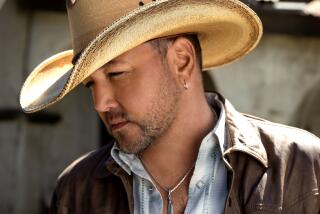Mississippi’s Neshoba County Fair Is Called Traditional--and Racist
- Share via
PHILADELPHIA, Miss. — The 103rd annual Neshoba County Fair offers all the makings of an old-fashioned good time--horse races and rodeos, barbecues and a Ferris wheel, fireworks and politics.
But some say there is more to the Neshoba fair than fun and games. They say this famed Southern institution is racist.
“It has long been a white affair where blacks were just allowed to work. In fact, blacks were not welcomed as visitors but rather as participants,” said Dr. Douglas Conner, NAACP chairman in nearby Oktibbeha County. “I’ve never been to the fair because I have not felt welcomed.”
Few blacks are seen at the fair, though blacks make up more than 30% of the county’s population. Those who are spotted are usually maids who clean the more than 600 elaborately decorated cabins that ring the fairgrounds.
“There’s lots of prejudiced people around here,” said Belinda Seals, an 18-year-old black woman who waited last year while her mother finished cleaning a cabin.
Black men don’t stray from the stables where they feed and wash the horses. The track is the state’s only legal horse-race course and dates back to 1894.
No blacks own cabins, but fair organizers say that isn’t unusual, given their relatively high cost--as much as $30,000 for one room.
“To the best of my knowledge, we never had any black person want to buy one,” said Alan King, vice president of the fair committee. He said a lottery was held last year for 25 vacant lots, and about 125 people applied.
The dirt alleys that separate the shacks have names such as Beverly Hills, Sunset Strip, Bourbon Street and Greenleaf Hollow. Many cabins are adorned with red, white and blue ribbons and, of course, Confederate flags.
This year’s fair runs from July 31 to Aug. 7. More than 40,000 people will party in the antique cabins or at campsites along red clay hillsides.
Once a small, turn-of-the-century picnic for Mississippi’s elite, the fair has mushroomed into an international attraction and the state’s single most important political event--a nearly compulsory stop for state office-seekers, a favored event for national candidates.
Ronald Reagan launched his 1980 presidential campaign from the fair’s saw dust pit. John Glenn visited in 1983, and Michael Dukakis in 1988.
All this takes place at an infamous location in the nation’s history. In 1964, the Ku Klux Klan reputedly shot to death three civil rights workers--one of them black--not far from where country music star Ronnie Millsap will entertain on a makeshift stage this year.
The murders of Michael H. Schwerner, James E. Chaney and Andrew Goodman along a dirt road near Philadelphia focused national attention on Mississippi’s violent resistance to desegregation.
No one was tried for the slayings, although seven men were convicted of violating the victims’ civil rights.
“This area will always be bad but it’s a lot better,” said Willie Jones Jr., a black who brought his standardbred Market’s Choice to last year’s race at the fair. “Mainly, they just don’t want to see a black with a white lady. As long as you don’t do that, you won’t have any problem.”
But last year’s race pointed up the racial tensions that remain: A fist fight between a white harness racer and his black opponent led to about 50 black racers withdrawing from competition. Blacks said whites were given preferential treatment by race judges.
The U.S. Trotting Assn., which regulates harness racing at about 400 fairs and 70 commercial tracks, says it won’t sanction the Neshoba races this year, though officials won’t say why. They would say only that the decision was based on “cumulative problems that have existed at the fair for years.”
Attorney Don Mitchell, who represents the predominantly black Mississippi Harness Racing Assn. Inc., says he has complained repeatedly to the USTA about discriminatory treatment of black drivers and other rule violations.
Norman Johnson Jr., fair committee president, said the races will go on, regardless, and that he expects 65 racers to compete. There are no racial problems, he said.
“This will be my 71st year of going to the fair and I don’t remember anybody not being welcome,” said Johnson.
But that’s the way it is at the fair. Everyone has been going for decades, and everything is governed by century-old tradition.
“My grandfather was one of the founders here and it would be sacrilegious if I didn’t come,” said 94-year-old Ellen Spendrup, one of the few people who dared to talk to the FBI after the 1964 murders.
Cabin owners and guests break out the barbecue grills and slouch lazily on shady front porches. The heat hovers in the mid-90s.
In the Pleasant Hill district, the 30 or so cabins are newer and further away from Founder’s Square, where all the action is. The people who live there had to spend six years on a waiting list.
A tape player blared over the late afternoon silence last year. A comedian was telling racist jokes, one that begins, “There was this Negro hippie. . . .”
The white man in front smiles as he bastes his chicken with mystery sauce.
“When I first came here in 1975, you could count the blacks on your hand. It’s still like that. You know why?” said former state Sen. Henry Kirksey, a longtime civil rights activist.
He pointed to a Confederate flag hanging from a cabin.
More to Read
Sign up for The Wild
We’ll help you find the best places to hike, bike and run, as well as the perfect silent spots for meditation and yoga.
You may occasionally receive promotional content from the Los Angeles Times.






